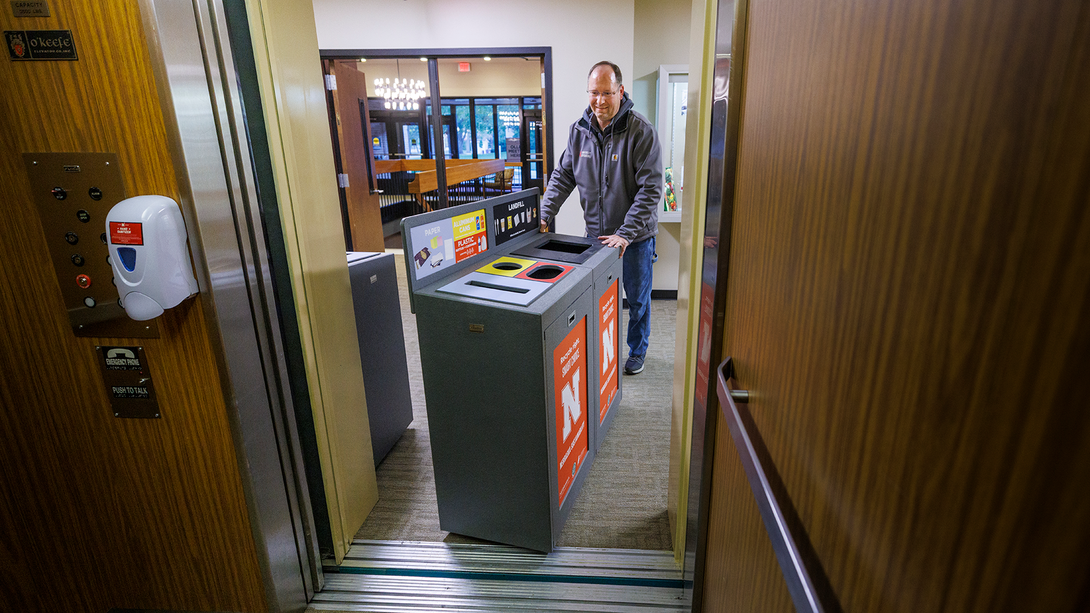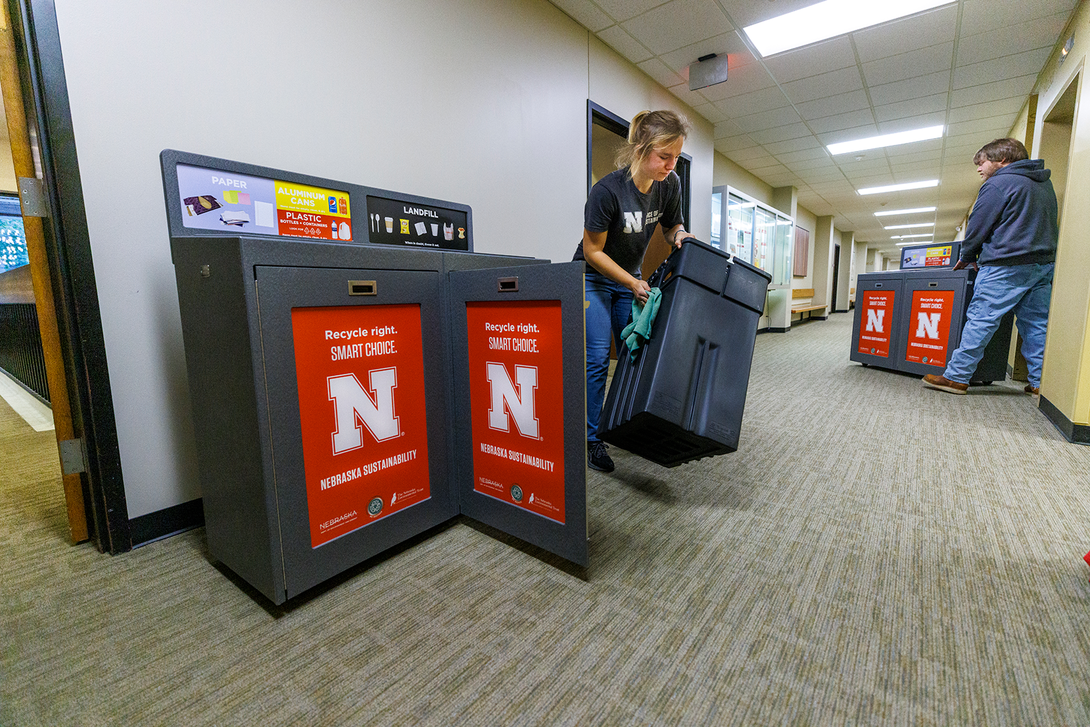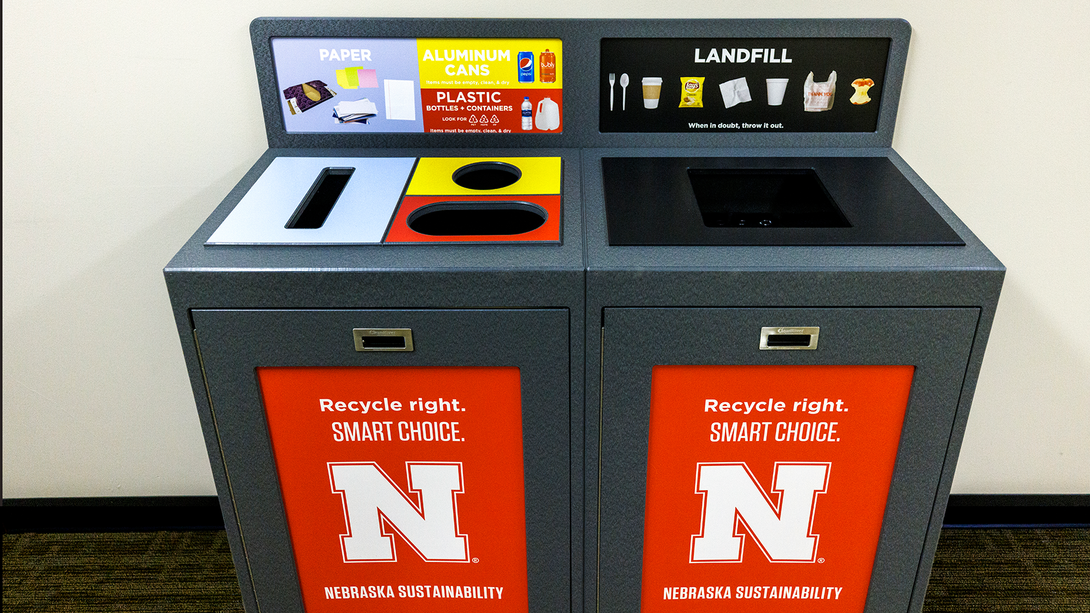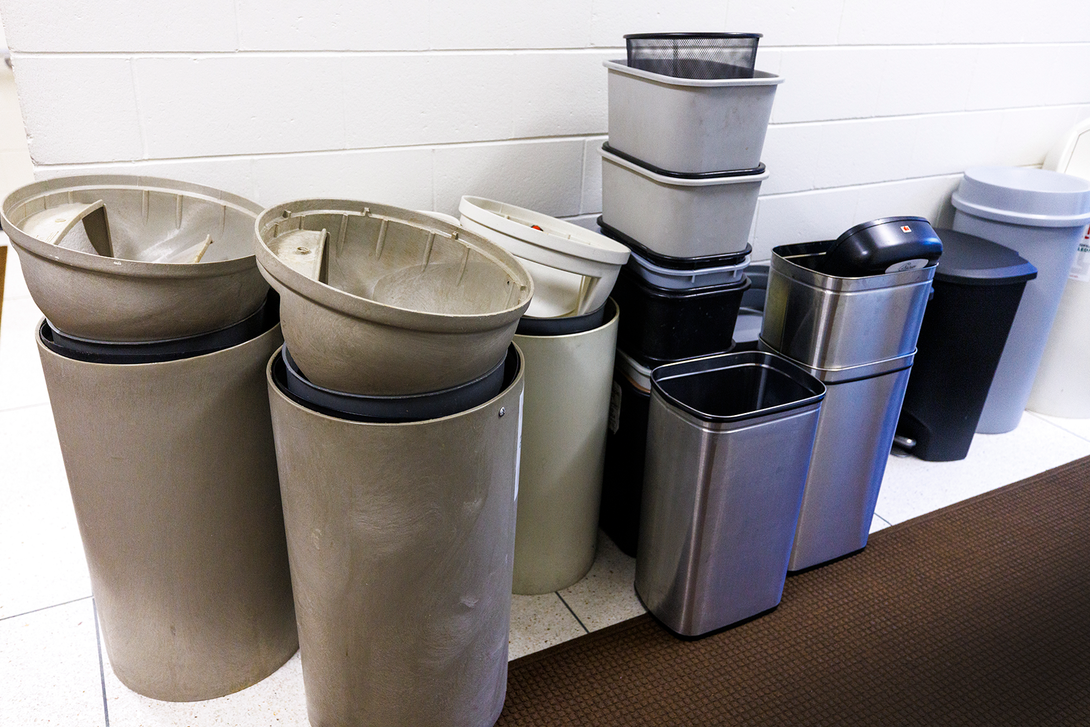
Campus community members can utilize consistent, convenient opportunities to reduce waste and properly recycle with the establishment of the universitywide “All in the Hall” recycling program.
The All in the Hall program has been approved by university leaders for campus implementation to make progress toward institutional sustainability goals. With the All in the Hall program, standardized waste stations will be installed in centralized, high traffic locations throughout campus buildings.
The program is intended to make recycling easier and more efficient, provide better education for the campus community, promote a sense of personal responsibility, and continue diverting waste from the local landfill. The All in the Hall program is based on the success of a recycling pilot project, which began operating in eight buildings of different scope and scale in December 2020. Implementation of the program will occur across campus over the next few years, and the first phase has started in seven buildings on City and East campuses.
“As implementation continues, we expect to increase the amount of materials correctly recycled at UNL and decrease the amount of materials sent to the landfill,” said Morgan Hartman, sustainability coordinator in the Office of Sustainability. “It is expected that empowering the UNL community to monitor and sort their waste items will lead to more mindful consumption and disposal behaviors, reducing contamination and improving recycling rates.”
The pilot project, which was recognized as a winner in the National Wildlife Federation’s 2022 Campus Race to Zero Waste Case Study Competition, evolved from the Office of Sustainability’s 2019 culture survey of approximately 9,000 faculty, staff, and students. The results indicated that 93% of respondents identified better recycling opportunities and education as a top priority.
Pre-pilot waste audits in each of the pilot buildings revealed that an average 18% of materials found in landfill streams could be recycled instead. Since implementation of the pilot project, this has decreased to 8%.
Through the broad implementation of the program over time, the Office of Sustainability expects to see further waste reduction and progress toward institutional waste reduction and diversion goals outlined in the university’s 2020 Environment, Sustainability and Resilience Master Plan.

The All in the Hall program will spread across campus through phased implementation over the next few years. The first phase of implementation occurred during the fall break in several City and East campus buildings. Buildings included in this phase of implementation are listed below:
City Campus: Love Library, Henzlik Hall and Teachers College Hall
East Campus: Chase Hall, Gwendolyn Newkirk Human Sciences Building and Splinter Laboratories
Carolyn Pope Edwards Hall has also begun operating under the All in the Hall program.
Campus buildings initially included in the recycling pilot project will be retrofitted later this year to reflect the updated waste station design and align with future efforts.
Prior to the implementation of the pilot project, recycling looked different from building to building as there was no defined structure or process for transporting recyclables from inside campus buildings outside for the university’s refuse and diversion services team to collect.
The All in the Hall program provides a convenient and consistent opportunity for instructors, staff, students and visitors to recycle within campus buildings. University community members will be asked to monitor the waste they produce while on campus and transport items to the nearest conveniently located, centralized station.
The standardized containers are designed to make recycling easier utilizing image-focused graphics placed near eye level and shape-restrictive openings to cue users regarding accepted materials. Waste stations will be placed using an “All in the Hall” methodology, targeting high-traffic areas in campus buildings — such as near restrooms and entrances.

Custodial Services staff will no longer collect landfill waste from private office spaces in campus buildings. Rather, they will focus on servicing all waste streams from the centralized locations, including both landfill and recyclable materials.

Most waste items commonly produced on campus are accepted for disposal in the waste stations. Clear, image-centric, color-coded graphics are located on top of the stations, providing direction on what is accepted in each stream.
The waste stations have four streams — paper, aluminum cans, plastic bottles and containers, and landfill. Corrugated cardboard is also accepted at the stations and should be flattened and placed behind the stations. Items placed in any recycling stream should be clean, dry, and free of food or other non-recyclable waste. More detailed information on accepted materials can be found on the UNL Recycling Guide.
Implementation of the All in the Hall program will be managed by the Office of Sustainability. Custodial Services is also a critical partner in this effort, as they are responsible for servicing both recyclables and landfill material from the centrally located waste stations.
“We are very pleased that broad implementation of the All in the Hall program will provide UNL faculty, staff, students, and visitors with a convenient and consistent opportunity to recycle within campus buildings,” Hartman said. “This effort will continue to foster progress toward achieving institutional goals outlined in UNL’s 2020 Environment, Sustainability, and Resilience Master Plan and further position UNL as a leader in sustainability in higher education.”







